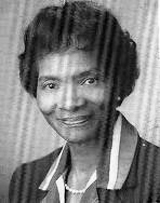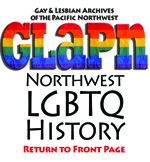HEARTS AND VOICES: GLADYS McCOY
PERSONAL RECOLLECTIONS OF OREGON GAY HISTORY
By George T. Nicola
Last updated October 20, 2010

Gladys McCoy
1. One of our earliest allies
The modern gay movement was still very young in 1972. However, there was a coast to coast effort to incorporate into the national Democratic Party platform a plank that would support federal legislation banning discrimination based on sexual orientation. I wanted to get help for this from the Oregon delegation.
I asked around and was told to contact Gladys McCoy. I had never met Gladys, but I knew that in 1970, she had run for the Portland School Board. She won, and in the process became the first African American to win elected office in Oregon.
When I first approached Gladys, she was busy, so she suggested we meet at another place to discuss my request. She was teaching a class at Pacific University in Forest Grove and she needed a speaker to address her students. If I would talk to her class about gay issues, she and I could later discuss my political request.
There were times when some of these presentations were better than others. I did best when I was more attuned to creating empathy in my audience. I don’t recall what I said to the class, but it must have been one of my better talks. When the class ended, Gladys came up to me and expressed a genuine commitment to our cause.
Shortly after I met her, she told me that someone had berated her for supporting gay equality. She had responded that she could not seek equal rights for herself as an African American if she did not support equality for gays.
In 1973, Gladys’ husband Oregon Representative Bill McCoy was a sponsor of the first Oregon state bill to ban sexual orientation discrimination. Since he signed on to the bill without hesitation, it is possible that his wife’s commitment influenced his decision. Both Bill and the McCoys’ daughter who worked for him went out of their way to make me feel welcome in the Capitol, where I was pretty much out of place among professional lobbyists and seasoned political people.
2. On to higher office
Gladys served as State Ombudsman for Governor Bob Straub from 1976 through 1978. There she helped Oregon gays communicate their needs to the governor. Gladys was elected to serve as a Multnomah County Commissioner from 1978 to 1984. She was elected Multnomah County Chair in 1986 and served in that capacity until her death in 1990. Bill was eventually elected state Senator.
I had not seen Gladys for ten years when I ran into her again in 1982. She was running for reelection as County Commissioner. Here was a fiftyish mother of seven campaigning with her gay supporters in a gay bar. When I walked up to Gladys, she immediately recognized me by name and started talking about the early days of Oregon’s gay civil rights movement.
3. An impressive legacy
Gladys had come to the halls of power from a background where opportunities for blacks and women were extremely limited. Born and raised in the segregated South, she at first studied to be a secretary until one of her teachers encouraged her to go further. She ended up studying social work at Talladega College. When she came to Portland in 1949, she found signs stating that some businesses “catered to whites only.”
Gladys married Bill and was for a while a stay-at-home mom raising their kids. Still, she managed to get a Masters in Social Work from Portland State University, and with that launched her career. (http://www.portlandonline.com/omf/index.cfm?&c=44053&a=1492050).
In 1996, Oregon State Legislature designated Gladys and Bill McCoy the “first African-American political family of Oregon.” The resolution called them “the modern-day pioneers who blazed the trail for members of the State’s African-American community” through their efforts in the struggle for equal protection and opportunity. (http://www.sunschools.org/Public/EntryPoint?ct=febb9a53c8e91110VgnVCM1000003bc614ac
RCRD&cpsextcurrchannel=1)
It’s significant that an Oregon pioneer as an African American and woman was also one of the first persons with any influence to take up the cause of Oregon gay equality. After all her struggle to rise above the limitation once set for her, she still found the time to help others.
In her oral history, Gladys was asked what advice she would give future generations. “Your attitude makes the difference.” she replied.” That is exactly the lesson she taught me in 1972.
In June, 2012, Gladys & Bill McCoy were among the Queer Heroes Northwest selected by GLAPN and Q Center as part of their PRIDE observance. Read those profiles here.
P.O. Box 3646 • Portland, OR 97208-3646 • info@glapn.or
Copyright © 2015, Gay & Lesbian Archives of the Pacific Northwest

